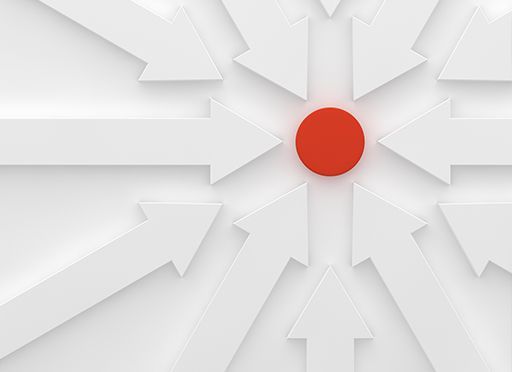Blockbuster author Daniel Pink delves into human motivation, explaining how savvy employers must embrace intrinsic rewards to motivate and fulfill their employees.

Intrinsic Rewards
In this New York Times bestseller, Daniel Pink, blockbuster author of To Sell Is Human, asserts that most business leaders don’t understand human motivation. They mistakenly try to impel their employees with extrinsic rewards or punishments – an operating system Pink calls Motivation 2.0.
This outmoded strategy may appear to produce results, but, Pink explains, it generates dysfunction. Instead of the carrot and stick, he says, leaders should offer workers three intrinsic motivations: autonomy, mastery and purpose. Pink ardently believes this will unleash greater performance and increase employee job satisfaction.
The Wall Street Journal said of Pink’s approach, “These lessons are worth repeating, and if more companies feel emboldened to follow Mr. Pink’s advice, then so much the better.” The Financial Times wrote that Pink, “… is rapidly acquiring international guru status…He is an engaging writer who challenges and provokes.” And Scientific American recognized that “Pink makes a convincing case that organizations ignore intrinsic motivation at their peril.”
Motivation 2.0
Pink’s premise is that societies function in identifiable and characteristic ways, much as computer operating systems function. Laws, customs, types of reasoning, economic institutions and assumptions about behavior, he suggests, guide daily life like software guides a computer. Pink identifies fear and survival as the heart of the earliest human operating system, Motivation 1.0. Participation in more complex and diverse cultures spawned the human operating system he calls Motivation 2.0; it prioritizes humankind’s drive to pursue rewards and avoid punishment.
Harnessing this second drive has been essential to economic progress around the world, especially during the last two centuries.Daniel H. Pink
Under Motivation 2.0, Pink explains, if workers perform poorly, companies punish them. If they perform well, employers reward them in the hopes of reinforcing excellence. Pink regards Motivation 2.0 as being so much the water in which everyone swims that people can’t perceive it or the ills it generates.
Pink details how people today work differently than in the past. They often work in teams, using open source technologies while relying on individual initiative and creativity. The workforce also has undergone a fundamental shift toward remote, hybrid and flexible work. Employment today, he notes, is often multifaceted and self-motivated, and thus requires a new operating system that encourages employees. Pink calls it Motivation 3.0.
Carrots and Sticks
Pink reports that people often pursue a task or solve a problem out of intrinsic motivation, such as the pleasure of working creatively.
Instead of restraining negative behavior, rewards and punishments can often set it loose – and give rise to cheating, addiction, and dangerously myopic thinking.
Daniel H. Pink
For example, he notes, the people who are most likely to carry out productive creative projects in art and science aren’t working toward an externally predetermined reward. Pink cites a software company owner who established a “results-only work environment” (ROWE) in which employees had no defined schedules and could work where they chose. Pink reports that productivity mostly went up, and worker happiness increased.
Mastery
Pink contends that people naturally want to improve, continuously and progressively, at whatever skill matters to them.
Unfortunately, despite sweet-smelling words like ‘empowerment’ that waft through corporate corridors, the modern workplace’s most notable feature may be its lack of engagement and its disregard for mastery.Daniel H. Pink
He asserts that to achieve mastery, you must adopt a growth mind-set, and you must believe you can accomplish your ambition. Further, he argues, you must accept that achieving mastery is an arduous goal that demands toughness and perseverance. Tellingly, Pink concludes by reminding you that you most likely will never achieve full mastery, but you should always strive to improve at whatever you do.
Meaning and Purpose
People are most content and productive, Pink discovered, when they are working toward a higher purpose.
From the moment that human beings first stared into the sky, contemplated their place in the universe, and tried to create something that bettered the world and outlasted their lives, we have been purpose seekers.Daniel H. Pink
Aware businesspeople now realize that purpose-driven organizations perform at a higher level, Pink reports. He emphasizes that Motivation 3.0 doesn’t oppose making money; it simply regards purpose as equally meaningful.
Motivate Yourself
Pink suggests – to ensure autonomy, mastery and purpose – that you monitor how you feel during the day, and whether your work engages or disengages you. Pink prompts you to identify your overarching purpose and to wrap up each day by asking what you accomplished, whether you learned anything new and whether you moved forward.
Beyond this, he advises, create a list of the actions and behaviors you want to avoid. Pink wisely cautions that mastery takes time and perseverance.
Inspire Your People
Pink urges you to give your employees the space and independence they need. He finds that people who run companies tend to be controlling and suggests that, instead, executives should loosen the reins. Let employees participate in creating their work goals because people perform better when pursuing targets they helped create.
Human beings have an innate inner drive to be autonomous, self-determined and connected to one another. And when that drive is liberated, people achieve more and live richer lives.Daniel H. Pink
Pink counsels leaders to avoid strident, prescriptive language. To increase people’s engagement, he says, replace commands with remarks that invite reflection and discussion.
Genius
Pink has a genius for instantly comprehensible, memorable hooks for the themes of his book – hooks likely to find their way into common parlance and thus to become Pink brand builders. Nobody heard of Motivation 3.0 before this book; now many of us will use it as a handy descriptor. Pink also has a genius for communicating enthusiasm, for readability, and for couching his arguments in terms that are easy to understand and that make his positions seem quite original, when in fact he may be repackaging current wisdom. Nonetheless, he expresses that current wisdom better than anybody else and in a way inspires his readers. Pink is a superb writer and, in this work, he keeps himself off the pages to an admirable degree. You may not need to read every page to get the point, but Pink will likely guide you to an entirely new perspective on your work and your employees’ motivation.
Along with the blockbuster To Sell Is Human, Pink’s books about business, work, creativity and behavior include the New York Times bestsellers When; A Whole New Mind; Free Agent Nation; and The Power of Regret.






